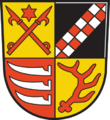Oder-Spree facts for kids
Quick facts for kids
Oder-Spree
|
|
|---|---|
 |
|
| Country | |
| State | Brandenburg |
| Capital | Beeskow |
| Area | |
| • Total | 2,242 km2 (866 sq mi) |
| Population
(2002)
|
|
| • Total | 196,655 |
| • Density | 87.714/km2 (227.18/sq mi) |
| Time zone | UTC+1 (CET) |
| • Summer (DST) | UTC+2 (CEST) |
| Vehicle registration | LOS |
| Website | landkreis-oder-spree.de |
Oder-Spree is a Kreis (which means a district, like a county) located in the eastern part of Brandenburg, Germany. It's a place where many people live and work, and it has a rich history.
The district gets its name from two important rivers that flow through it: the Spree and the Oder. The Oder River also forms the eastern border of the district, separating it from other areas.
Contents
A Look Back: How Oder-Spree Was Formed
The Oder-Spree district was created in 1993. Before this, the area was made up of several smaller districts and cities. These included the districts of Beeskow and Fürstenwalde, and the independent city of Eisenhüttenstadt. They all joined together to form the larger, single district we know today as Oder-Spree.
What the Oder-Spree Coat of Arms Means
Every district has a special symbol called a coat of arms. The Oder-Spree coat of arms tells the story of the three old districts that joined to create it.
- In the top-left corner, you see the symbol of the Bishops of Lebus. They used to live in Fürstenwalde.
- The second part shows a checkered pattern. This represents the Cistercian Order, a group of monks who had an important abbey (monastery) called Neuzelle. This abbey owned a lot of land in the area that later became Eisenhüttenstadt.
- The bottom two parts of the coat of arms symbolize the old Beeskow district. The three knives are a symbol of the Lords of Strehla. The deer antler is the symbol of the Lords of Biberstein. These lords took over the ownership of Beeskow and Storkow in 1317.
Towns and Municipalities in Oder-Spree
The Oder-Spree district is made up of many towns and smaller communities called municipalities. Some towns are "Amt-free," meaning they manage their own affairs directly. Other smaller communities group together into "Ämter" (plural of Amt), which are like administrative unions that help manage several villages or towns together.
Amt-free Towns
These towns manage their own local government:
- Beeskow
- Eisenhüttenstadt
- Erkner
- Friedland
- Fürstenwalde
- Storkow
Amt-free Municipalities
These are smaller communities that also manage their own affairs:
- Grünheide
- Rietz-Neuendorf
- Schöneiche
- Steinhöfel
- Tauche
- Woltersdorf
Ämter (Administrative Unions)
These are groups of smaller towns and municipalities that work together:
- 1. Brieskow-Finkenheerd
- Brieskow-Finkenheerd (This is the main town for this Amt)
- Groß Lindow
- Vogelsang
- Wiesenau
- Ziltendorf
- 2. Neuzelle
- Lawitz
- Neißemünde
- Neuzelle (Main town for this Amt)
- 3. Odervorland
- Berkenbrück
- Briesen (Main town for this Amt)
- Jacobsdorf
- Madlitz-Wilmersdorf
- 4. Scharmützelsee
- Bad Saarow (Main town for this Amt)
- Diensdorf-Radlow
- Langewahl
- Reichenwalde
- Wendisch Rietz
- 5. Schlaubetal
- Grunow-Dammendorf
- Mixdorf
- Müllrose (Main town for this Amt and also a town)
- Ragow-Merz
- Schlaubetal
- Siehdichum
- 6. Spreenhagen
- Gosen-Neu Zittau
- Rauen
- Spreenhagen (Main town for this Amt)
Images for kids
See also
 In Spanish: Distrito de Oder-Spree para niños
In Spanish: Distrito de Oder-Spree para niños


